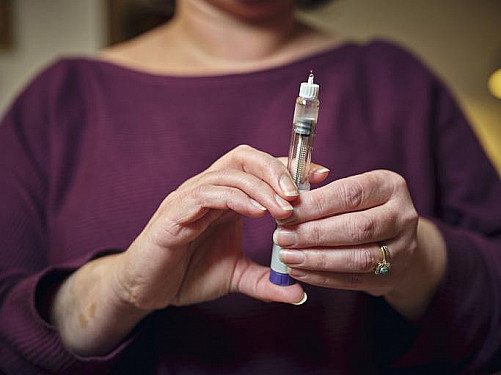Diabetes drug showing promise for prostate cancer treatment
By Peter Wehrwein
Metformin—the drug that millions of people with diabetes take to control their blood sugar—may be on the brink of a second career. Evidence from a variety of studies suggests that metformin may delay or slow the progression of prostate cancer.
At same time, researchers are finding that metformin does not seem to prevent the development of prostate cancer in the first place. One possible explanation for the discrepancy is that while metformin may curtail the survival of cancer cells, and so be helpful in treatment, it may not have much influence on the events that initiate cancer and transform normal cells into cancerous
The interest in metformin’s anticancer potential is not limited to prostate cancer. On www.clinicaltrials.gov, maintained by the National Institutes of Health, you’ll find more than 60 clinical trials of metformin being tested as a treatment for many different cancers, including breast, colon, endometrial, and pancreatic cancer. A dozen different prostate cancer trials are listed, four of which are still recruiting volunteers.
Part of the attraction here is that metformin is inexpensive. Metformin is sold under brand names like Glucophage and Fortamet but is readily available as a generic. For someone taking metformin for diabetes, a month’s supply of the generic can cost as little as $5.
Study finding: Metformin use after diagnosis lowers risk of dying from prostate cancer
The latest findings regarding metformin and prostate cancer come from a research group at the University of Toronto. Because of universal health insurance, Canada is a treasure trove of patient databases, and the Toronto researchers did this study by cross-referencing diabetes, cancer, and drug benefit databases for the province of Ontario. They study included 3,837 men with diabetes and median age of diagnosis was 75.
Writing in the Journal of Clinical Oncology, the researchers showed a correlation between taking metformin after prostate cancer diagnosis and a decreased risk of dying from the disease. More specifically, the researchers found that each additional six months of metformin use after diagnosis was associated with a 24% decrease in the risk of dying from prostate cancer. The risk of dying from any cause also declined with post-diagnosis metformin use but that association weakened as time went on.
Toronto researchers conducted several studies-within-the-study, looking at various subgroups, partly to guard against the misleading “healthy-user effect”: metformin users might have lower risk of deadly prostate cancer because they are healthier to begin with, not because of anything to do with metformin. But when they compared men who took metformin to those who managed—or tried to manage—their diabetes with diet, metformin again came out looking like it was protective; the metformin takers were 46% less likely to have died from prostate cancer than the dieters.
All the usual warnings about correlation not equaling correlation apply. And keep this mind: only men with diabetes were included in this study. It is an open question whether men with prostate cancer who don’t have diabetes might benefit from metformin. That is one of the questions the current crop of clinical trials may answer.
Metformin does not prevent prostate cancer
The same group of researchers published the results of an earlier study in the Journal of the National Cancer Institute. This time they looked at metformin use before diagnosis. Crunching numbers from some of the same databases used in the other study, the researchers found no correlation between metformin use and the risk of being diagnosed with prostate cancer among older men (ages 66 and older) with newly diagnosed diabetes.
Other prostate cancer prevention studies have found that an agent or risk factor appears to protects against low-grade prostate cancer—which may be so slow growing (“indolent”) that it doesn’t pose much of a health risk—but not against advanced disease, which certainly can be lethal and is what you really want the most protection against.
But this study didn’t find any such difference. Metformin had no effect on the diagnosis of low-grade prostate or high-grade prostate cancer. The negative result is not a huge surprise. Similar studies have also come up empty handed, and the ones that haven’t have had some flaws that make the results unreliable.
Why would metformin have anti–prostate cancer effects?
Still, hopes that metformin will be useful in prostate cancer treatment are very much alive and kicking. And even if you were to ignore the epidemiological evidence, there are reasons to believe that metformin might have some treatment benefit.
The effect may be indirect. Metformin lowers the amount of insulin circulating in the blood by lowering blood sugar levels and by making tissue more sensitive to insulin, which is a hormone that pulls blood sugar out of the blood and into cells. Insulin and related factors tend to rev up some cancers, including prostate cancer, making them more likely to proliferate and spread. So by lowering circulating insulin levels, metformin may be taking away some of the stimulus for prostate cancer cell growth.
Metformin may also have more direct effects. Metformin lowers the blood sugar output of liver cells by hampering energy-generating processes within their mitochondria. It may do the same to cancer cells and their mitochondria—and cancer cells, which are growing and dividing with the brakes off, need those energy-generating processes going full tilt.
Other research suggests that metformin’s direct effects may be the result of its interactions with complicated chains of chemical reactions called signaling pathways that can nudge dangerous cancer cells into programmed cell death (apoptosis).
How metformin might be used in prostate cancer therapy
Where metformin might fit into prostate cancer treatment is hard to say. There’s little, if any, evidence from clinical trials to go by, and the clinical trials planned or underway run the gamut from metformin for untreated low-risk cancer to cancer that has metastasized. [http://clinicaltrials.gov/ct2/results?term=%22metformin%22+and+%22prostate+cancer%22&Search=Search]
University of Toronto researchers are conducting the Metformin Active Surveillance Trial (MAST) study. Men in active surveillance have elected to have their low-risk prostate cancer closely monitored rather than treated right away. The study randomizes men on active surveillance to receive metformin (850 mg, twice a day) or a placebo for three years. The study is designed to see whether metformin will delay the need for primary prostate cancer treatment (prostatectomy, radiation, hormone therapy).
Other studies are focusing on men starting hormone therapy, also known as androgen deprivation therapy. Hormone therapy lowers testosterone levels. When that happens, insulin levels often increase, which metformin could presumably counteract. High insulin levels are unhealthy for a variety of metabolic reasons, but they may also contribute to the return of prostate cancer despite hormone therapy and the suppression of testosterone levels. So it’s possible that metformin might help augment the effects of hormone therapy.
Researchers are also conducting trials in men after hormone therapy has failed to control their cancer. For example, French investigators are conducting a trial called TAXOMET which is comparing the chemotherapy drug docetaxel (sold under the brand name Taxotere) alone or with metformin. Prostate cancer that comes back after hormone therapy is often lethal, but a number of new treatments have become available lately, and there’s a lot of interest in any modifications that might make them more effective.
About the Author
Disclaimer:
As a service to our readers, Harvard Health Publishing provides access to our library of archived content. Please note the date of last review or update on all articles.
No content on this site, regardless of date, should ever be used as a substitute for direct medical advice from your doctor or other qualified clinician.















